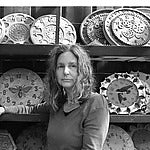
Beth Sherman
Honeybee Ceramics
The subject matter of Beth Sherman's work is primarily informed by her reverence for the beauty and integrity of the natural world, and her sadness for its precarious state. After many years of making art that was personal and idiosyncratic, Sherman developed a strong pull to create art objects that were useful and accessible, and that contributed to each home being a sanctuary.
Beth Sherman creates her work using a process called slip-casting. She first sculpts the original design out of modeling clay. From this original design a plaster mold is made. Slip, which is clay in a liquid form, is poured into the plaster mold. The plaster absorbs the water out of the slip, and once the slip becomes solid, it can be popped out of the mold.
As a university art major, Beth Sherman focused on painting. After graduating, she discovered metalsmithing and ceramics at the local junior college. Working at a small tile shop hand painting tiles, she learned the process of slip-casting as well as how to use a tile press and apply glazes. As part of an art community and a farming community, Beth is stimulated by the botanical world and fellow artists.




